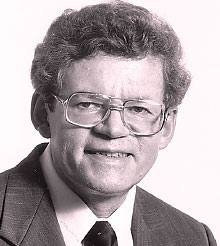Rodrigo Muñoz, M.D., First Hispanic President of APA, Dies
Abstract
Muñoz worked with John Feighner, M.D., on a seminal paper on psychiatric nosology that helped pave the way for the modern DSM.
Rodrigo Muñoz, M.D., the 127th president of APA, died November 28, 2020. He was 81 years old.

Rodrigo Muñoz, M.D., took a clinical and research interest in the integration of psychiatry and medicine.
Muñoz, who served as president for the 1998-1999 term, was the first Hispanic president of APA. He was born in 1939 in Popayan, Colombia. He graduated from the Universidad del Cauca in 1963 and did his initial psychiatric training in the Antioquia Mental Hospital before coming to the United States where he completed his training at Washington University Hospital in St. Louis.
In an article in the American Journal of Psychiatry at the end of his presidential year, former APA President John McIntyre, M.D., wrote that the period at Washington University was formative for Muñoz. “Rodrigo was very energized in that program and has frequently remarked that the five years he spent in St. Louis were a highlight of his professional life. In that setting Rodrigo’s engagement with what we now call evidence-based medicine began to flower. He developed and has maintained a very active interest in nosology, and along with [John] Feighner and others co-authored the 1972 seminal paper in the Archives of General Psychiatry on diagnostic criteria for use in psychiatric research. This work was the forerunner of our criteria-based DSMs.”
In 1970, Muñoz and his family moved to Sheboygan, Wis., where in addition to a private practice he directed an alcohol and substance abuse program and a geriatric program. In 1974, his first wife died suddenly, and Muñoz and his three children—then aged 9, 5, and 2—moved to California.
At the University of California, San Diego (UCSD), Muñoz was a clinical professor of psychiatry and received the Distinguished Clinical Teacher Award. He also received the Outstanding Mentorship Award from the California Medical Students Association.
Past APA President Dilip Jeste, M.D., a distinguished professor of psychiatry and neuroscience at UCSD, said Muñoz had legions of admirers at the institution. “He was a dear friend and mentor for many people at UCSD,” Jeste said. “For me, he was not just a supporter but also a role model as the APA president. We have lost a trailblazer.”
Close friend and colleague Renato Alarcon, M.D., M.P.H., emeritus professor and consultant in psychiatry at Mayo Clinic and its medical school in Rochester, Minn., told Psychiatric News that Muñoz’s active involvement with APA started in the late 1970s. “His trajectory in our institution allowed him to thoroughly display his leadership and organizational talents as well as his profound faith in human possibilities guided by principles of integrity, loyalty, social justice, determination, and dignity.”
He added, “Rodrigo Muñoz was not only a great psychiatrist but also a fundamentally compassionate human being. He loved to share his knowledge, talents, and constructive actions. He believed in genuinely humanistic values, in the honest combination of scientific zeal and artistic sensibility to deal with our patients and in the need for generosity and courage to confront the many faces of adversity.”
APA CEO and Medical Director Saul Levin, M.D., M.P.A., said that as the first Hispanic president, Muñoz helped pave the way for a more diverse APA. “Because of leaders like Rod Muñoz, APA is more representative of its membership. He always led with quiet but strong leadership and compassion and upheld the values of what psychiatrists stand for in helping our patients, members, and staff. We are saddened by his death and wish his family and wide circle of admirers condolences and peace.” ■



